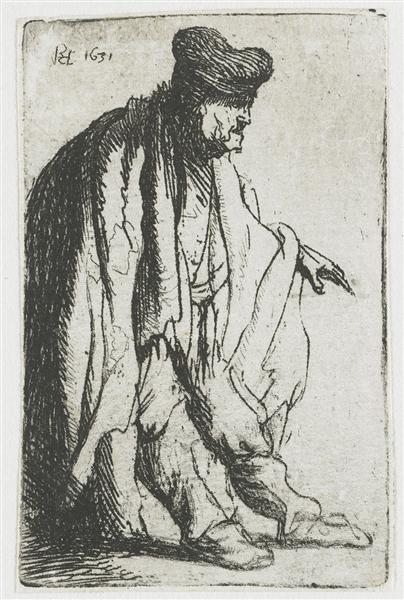Description
The painting "Mendigo with the extended left hand" of Rembrandt, created in 1631, is a masterpiece that encapsulates the artist's ability to capture the human condition through its characteristic use of light and shadow. This portrait, which represents an austere -looking beggar, reflects both the empathy that Rembrandt feels towards the disadvantaged classes and their technical skill. With his personal style, Rembrandt enters the subject's psychology, exploring the emotions and dignity of those who are often ignored by society.
Obtaining carefully the composition of the work, the viewer meets an intimate representation of the beggar that appears in the foreground. Dress with rags, its expression is a mixture of suffering and resignation, transmitting a sense of vulnerability that invites reflection. The man's position, with the left hand extended, suggests an implicit gesture of plea. Rembrandt uses the chiaroscuro technique, which not only models the figure but also directs attention to his face, highlighting the wrinkles and wear that mark his life. The light, which falls gently on his gaze, creates a focal point that emotionally connects the viewer with the individual portrayed.
The use of color in this paint is equally remarkable. Rembrandt uses a palette of earthly and warm tones, predominantly browns and ocher, which evoke an atmosphere of raw reality. These tones not only reinforce the seriousness of the beggar's situation, but also have a subtle contrast with the light that radiates their face, giving it an almost divine quality. This balance between light and darkness is fundamental in the art of the Dutch painter, who achieves, with mastery, to transmit a deep humanity even in the moments of greatest desolation.
The socioeconomic context of the time in which Rembrandt painted this work is equally relevant. He lived in a period of transition in the Netherlands, where prosperity and poverty coexist, becoming more evident the struggle of those who roam the streets of Amsterdam. Rembrandt's works often show these characters in everyday life, showing not only their technical skill but also their social concern. In "Mendigo with the left hand extended", Rembrandt rises as a portraitist of empathy, capturing the essence of humanity in its most fragile form.
Also, this painting resonates with others of its time that address similar social issues. It reminds us, for example, "the man of the red turban" or "the doctor of the plague", where the interaction of the light and the human figure becomes a means to express the duality of existence: life and the death, wealth and misery. In each of these works, Rembrandt manages to melt its technique with a deep sense of narration.
In summary, "beggar with the extended left" is a work that transcends their own representation, inviting viewers to contemplate about humanity and dignity despite adverse circumstances. Through a seemingly simple portrait, Rembrandt evokes a much broader dialogue about the human condition, which makes it an essential piece to understand its legacy and its influential role in art history. The work is not only a testimony of its technical mastery, but also a call to empathy, something that remains visceral and relevant today.
KUADROS ©, a famous paint on your wall.
Hand-made oil painting reproductions, with the quality of professional artists and the distinctive seal of KUADROS ©.
Reproduction service paintings With a guarantee of satisfaction. If you are not completely satisfied with the replica of your painting, we refund your money 100%.

